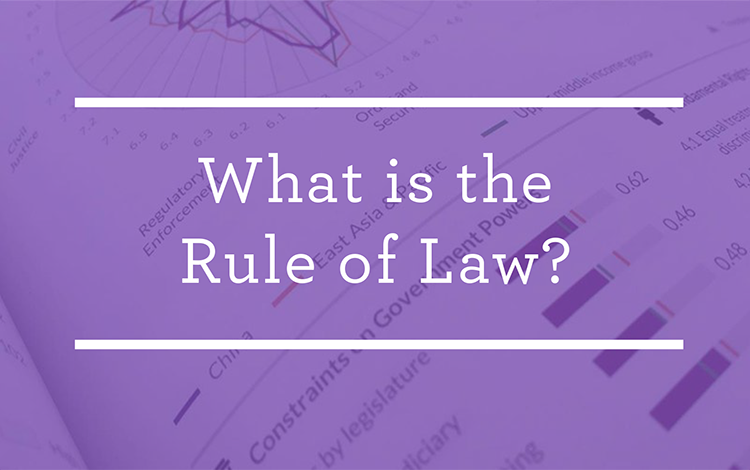The Concept of “Rule of Law” (CSS Constitutional Law Paper 2016) Solved
The Concept of “Rule of Law” is an integral part of the British constitution. Explain this in the light of Dicey’s Exposition on the rule of law. Also elaborate its present day modern concept in a state. (CSS Constitutional Law Paper 2016)
Rule of Law
The rule of law is a term that is often used but difficult to define. A frequently heard saying is that the rule of law means the government of law, not men. But what is meant by “a government of law, not men”? Aren’t laws made by men and women in their roles as legislators? Don’t men and women enforce the law as police officers or interpret the law as judges?
The idea of the rule of law has been around for a long time. Many societies, including our own, have developed institutions and procedures to try to make the rule of law a reality. These institutions and procedures have contributed to the definition of what makes up the rule of law and what is necessary to achieve it.
Meaning of Rule of Law |(CSS Constitutional Law Paper 2016)
The origins of the expression “rule of law” in English are uncertain. The first recorded use of the expression that the Oxford English Dictionary can find is by John Blount. Around 1500. Blount, a kinsman of William Blount, 4th Baron Mount joy and a fellow at All Souls College, Oxford, translated into English some selected portions of Nicholas Upton’s Dc Studio Militari (a forgettable 1447 treatise on heraldry and the military). Blount rendered the Latin Juris regula as (using the spelling of his time) the Rewle of lawe.
Check Also: Presidential – Constitutional Structure | CSS Constitutional Law Notes
The term “Rule of Law” is derived from the French phrase ‘La Principe de Legality’ (the principle of legality) which refers to a government based on principles of law and not of men In a broader sense Rule of Law means that Law is supreme and is above every individual. No individual whether if he is rich, poor, rulers or ruled etc. are above law and they should obey it. In a narrower sense the rule of law implies that government authority may only be exercised in accordance with the written laws, which were adopted through an established procedure. The principle of Rule of Law is intended to be a safeguard against arbitrary actions of the government authorities. The rule of law has been described as a “rare and protean principle of our political tradition”. The rule of law centrally comprises “the values of regularity and restraint, embodied in the slogan of “‘a government of laws, not men’”. The term Rule of Law does not provide any thing about how the laws are to be made, or anything specific like the Fundamental Rights or the Directive principles or equality etc. but it provides for two basic concepts that is Law must be obeyed by the people and that the law must be made in such a way that it is able to guide the behavior of its subjects. Different legal theorists have different approaches towards the concept of Rule of Law. Some believe that the rule of law has purely formal characteristics, meaning that the law must be publicly declared, with prospective application, and possess the characteristics of generality, equality, and certainty, but there are no requirements with regard to the content of the law. While other legal theorists believe that the rule of law necessarily entails protection of individual rights. Within legal theory, these two approaches to the rule of law are seen as the two basic alternatives, respectively labeled the formal and substantive approaches
The credit for developing the concept of Rule of Law goes to Professor A.V. Dicey who in his classic book “Introduction to the Study of the Law of the Constitution” published in the year 1885 tried developing the concept of Rule of Law. As per Diecy no man is punishable or can be lawfully made to suffer in body or goods except for a distinct breach of law established in the ordinary legal manner before the ordinary Courts of the land This establishes the fact that law is absolutely supreme and it excludes the existence of arbitrariness in any form. According to Diecy where there is scope discretion there is room for arbitrariness So Dicey held that every man, whatever be his rank or condition, is subject to the ordinary law of the realm and amenable to the jurisdiction of the ordinary tribunals
Dicey’s Introduction to the Law of the Constitution, published in 1885, acts almost as a substitute for a written constitution. His ideas lock up together to form the ideal-type of a ‘balanced’ constitution, in which the executive, envisaged as capable of arbitrary encroachment on the rights of individual citizens, will be subject, on the one side, to political control by Parliament and, on the other, to legal control through the common law by the courts. As expressed by Dicey in terms of the twin doctrines of the rule of law and parliamentary sovereignty, the balance necessarily tips in favor of representative government
The ancient philosophical ideal of the rule of law can be traced to Aristotle’s government of ‘laws not men’ and has been explored by generations of political philosophers. It provides the basis for the idea of ‘limited government’ and ‘constitutionalism’ (government limited by law and by a constitution or constitutional principles).
Check Also: Law MCQs
Dicey’s late nineteenth-century restatement of the rule-of-law doctrine comprised three elements
- that the state possesses no ‘exceptional’ powers and
- that individual public servants are responsible to
- the ordinary courts of the land for their use of statutory powers:
DICEY’S THEORY of Rule of Law consists of three main principles
- Absence of Arbitrary Power or Supremacy of Law: As per Dicey Rule of law means the absolute supremacy of law and ‘no man is punishable or can lawfully be made to suffer in body or goods except for a distinct breach of law established in the ordinary legal manner before the courts of the land. Diecy was of the view that all individuals whether if he is a common man or government authority are bound to obey the law. He is of the view that no man can be punished for anything else than a breach of law which is already established. And also that the alleged offence is required to be proved before the ordinary courts in accordance with ordinary procedure.
- Equality before Law: As per Diecy Rule of law, in the second principle, means the equality of law or equal subjection of all classes of people to the ordinary law of the land which is administered by the ordinary law courts. In this sense rule of law conveys that no man is above the law. Even the Government Officials are under a duty to obey the same law and there can be no other special courts for dealing specifically with their matters.
- Constitution is the result of the ordinary law of the land: As per Diecy, in many countries rights such as right to personal liberty, freedom, arrest etc. are provided by the written Constitution of a Country. But in England these rights are a result of the judicial decisions that have arisen due to the conflict between the parties. The constitution is not the source but the consequence of the rights of the individuals.
COMPONENTS OF RULE OF LAW: Rule of Law is a dynamic concept but it is somewhat difficult to define. Every person has its own way of defining rule of law some think it to be the supremacy of law; some think it to be the principles like clarity, universality, stability etc. Due to all these reasons certain ingredients of Rule of Law have been identified and all which need to exist for the concept of Rule of Law to survive.
Difference between ‘Rule by Law’ and ‘Rule of Law’?
Rule by law’ simply means rule by any law which is laid down by the supreme law making authority of that country. One is not concerned about what the law is or what its purpose is. In most of the dictatorships and monarchies, there is a set of laws through which the justice is administered. But, in such countries, rule of law does not exist.
On the other hand, ‘rule of law’ connotes rule of law which is based on certain principles of law. This word is also drawn from a French word ‘spirit delegalize’. What the principles of law will be is a point of considerable debate. The concept of rule of law was developed by Dicey after he observed the development of law in France. At that particular point of time, France had two system of laws and two system of courts governing the same territory and the same group of people. One system was known as the Civil Law System. It was the law which was passed by the Parliament. It governed the relationship between the people inter se.
The second system was ‘droit administratif’ which was a system especially designed by the government to decide the disputes between the government, government servants and the people. The law which was applied there was not that which was passed by French Parliament. It was developed by the highest administrative court on a case to case basis. If there was some kind of conflict between a common man and the government, the matter went to the administrative court. It was a part of the administration. The judges were government servants and they administered the law which was laid down by the highest administrative court. From this, Dicey was trying to understand how justice is possible. Therefore he said that it is a rule according to law. It is not a ‘rule of law’ and hence justice is not being done to the people. He came to the conclusion that in England, there is no administrative law and in England, the fundamental principles of the British Constitution are two:
- The Supremacy of the British Parliament
- Rule of Law
The basic concept of rule of law is to control the unlimited exercise of the power by the supreme law making authority of the country. Rule of law also means certain principles. If in any society, the law by which the people are ruled is based on both the particular principles, then only one would say that that particular society is a rule of law society. Otherwise, every other society is a ‘rule by law’ society.
Essential Characteristics of a ‘Rule of Law’ Society
Rule of law also means certain principles. Following are the principles on which a ‘Rule of Law’ Society is to be based:
Pre-eminence of Law – Dicey said that law must be general in character. In a society, where the law is made for individuals, such society is not a universal society. Laws are to be made general in nature. This does not mean that law must be uniform for everybody. As we know that classification of people is possible. So the law can be different for different people but the basis for classification must be reasonable. When law is made for a certain group, it must be based on a reasonable differentia which has a reasonable nexus with the purpose sought to be achieved.
- Pre-eminence of law also means absence of wide discretionary powers. Dicey tried to observe that in France, the government servants in France were given wide discretionary powers to interfere with the private lives of the people. He said that law must not allow wide discretion to the administrative authorities. Anywhere, where there are wide discretionary powers vested with the authorities, there would be rule by law and not rule of law. (CSS Constitutional Law Paper 2016)
- He also said that law must always be for future applications. Prospectivity is one of the key characteristics of ‘rule of law’. Law can have retrospective effect provided there is reasonableness and justness. However, criminal law cannot be made with retrospective effect.
Also, law must be certain and must be known in advance. Whatever law is there, it must be certain in the sense that it must give complete awareness about what is right and what is wrong so that a person can regulate his/her conduct accordingly. If the law is vague and uncertain, no matter it may be a law but it will not be ‘rule of law’.
Rule of Equality – Law must be based on the principles of equality. Equality means that all the persons must be subjected to the same system of courts and must be governed by the same law. Equality does not mean uniformity. It means two things: (CSS Constitutional Law Paper 2016)
- Equity
- Differentiated Equality
The Principle of Accountability – Everybody must be under the same law and no matter how high a person is, the law must always be above him. No special privileges and immunities should be given to any special person. Everybody must be accountable for the violation of law and must be accountable to the ordinary system of courts. In France, Dicey observed that there is no rule of law because the government servants were accountable to a different system of law and common man was accounted to another system of law. The differentiation made must be rational, just and fair. There should be only one agency to enforce accountability on the people. (CSS Constitutional Law Paper 2016)
Pre-eminence of Common Law – Dicey talked about the fundamental rights of the people. Rule of law means that the law should be based on the concerns of the Human Rights. If a law violates human rights of the people, then there is no rule of law. Law must honour the fundamental rights of the people and those rights must not be protected by any document. Those rights must be protected by accepting the customs and the traditions of the people. (CSS Constitutional Law Paper 2016)
Dicey was against including fundamental rights into any document or constitution. He said that if rights of the people flow from a document, then such a document could be thrown away by the successive governments. The fundamental rights of the people must be evolved from the customs and the traditions which no government can change and must be recognized by the administration. Every human being has certain inherent rights. (CSS Constitutional Law Paper 2016)
If the law of any country is based on the above-mentioned four principles, it will be a ‘rule of law’ society and if not, it will be a ‘rule according to law’ or ‘rule by law’ society.
The rule of a law is a practical paradigm. Law has two aspects, law and enforcement. There may be a rule of law where all the characteristics of ‘rule of law’ society are present, yet if the law is not properly executed or interpreted by the courts, then also there won’t be a ‘rule of law’ society
The Rule of Law in British Constitution
Britain does not have a written constitution therefore the Rule of Law, which along with Parliamentary Sovereignty, was regarded by Legal analyst A.C Dicey, as the pillars of the UK Constitution, the Rule of Law was said to be adopted as the “unwritten Constitution of Great Britain”.
In those days, many statutes allowed priority of administrative power in many cases, and the rule of law is a nostrum elucidated in ‘An Introduction to the Study of the Constitution’ by Albert Venn Dicey. Dicey wrote this tome in the late 19th century when he was professor of Public Law in the University of Oxford. Dicey said that there are three cardinal principles of the rule of law. These are that no one can be punished except by the law. No one is above the law. Rights and freedoms are best safeguarded by common law rather than by statute.
Dicey elaborated on his first principle saying that, ‘no man can be injured in body or goods except by the law.’ This notion has a respectable heritage dating back to Magna Carta (1215) at least. Dicey’s dictum was a claim that one could not be arbitrarily locked up or to have goods confiscated unless this was a punishment handed down by a properly constituted criminal court. The US Constitution enshrines the same principle that one cannot be deprived of life, liberty or property unless as a punishment imposed by a court after due process.
Dicey’s second principle states that all are equal before the law. That is to say that all may be called to account before a court and may be penalized if they are in breach of the law. A V Dicey contrasted this with the situation in France where some state officials were immune from the law. When Dicey enunciated this notion it was a fairly novel one as at that time clergy in other countries were sometimes tried before ecclesiastical courts rather than courts of the state.
Dicey’s statement that rights and liberties are best protected by common law exemplifies what was at the time a typical English coolness towards statute. Some judges and lawyers thought that statute was an intrusion on the territory of jurists. Their literal interpretation of statute law at the time was perhaps an attempt to hit back at Parliament for having the temerity to interfere, as some saw it, in the judicial sphere. Many Englishmen placed a touching faith in the traditions of the common law to uphold freedom. Such a view persisted long into the 20th century with some judges opposing signing up to the European Convention on Human Rights and Fundamental Freedoms on the grounds that English judges and magistrates instinctively knew what rights one was entitled to and there was no need to adopt a new-fangled and foreign code as to liberty. (CSS Constitutional Law Paper 2016)
A V Dicey’s claims are open to criticism. Jenkins in 1959 penned a highly effective repudiation of many of Dicey’s assertions. Jenkins noted that sentences awarded by courts varied enormously. For manslaughter one could be set at liberty at once or indeed imprisoned for life without possibility of parole. Therefore any notion that all were equal before law seemed to be bunk. Excessive judicial discretion made for an arbitrary system. Jenkins further critiqued Professor Dicey’s work by observing that under the Defense of the Realm Act one could be conscripted even in peacetime and have one’s property confiscated and perhaps not receive a penny by way of compensation for such sequestration. The claim that all are equal before law seems to be a trifle thin in any monarchy. In the United Kingdom the sovereign can do no wrong. This is why decisions of the executive cannot be challenged by the judiciary except through judicial review which examines the legality only of the decision making process and not of the decision itself. (CSS Constitutional Law Paper 2016)
Dicey’s astonishing claim that one’s rights are liberties are most effectually upheld through common law rather than by statute law is a view that is now widely regarded with derision. Through the twentieth century it was found necessary to pass numerous statutes in order to bring equality and liberty to huge swathes of society. Dicey was an outspoken supporter of the Conservative Party and an outright opponent of any modicum of self-government for Ireland. Few beyond the hard right would have any truck with his disdain for statute law as an instrument of justice. Statutes to grant the right to vote and other rights to women have been passed through the twentieth century. The Equal Pay Act was another milestone for gender equality. The Race Relations Acts were also passed to assist in realizing racial equality. Statutes against incitement to racial and religious hatred were found necessary. The Human Rights Act in 1998 incorporated most of the European Convention on Human Rights into domestic UK law. Up until this time significant human rights abuses had been committed by the British State. In the 1950s a number of atrocities were committed in Kenya by British soldiers. These were illegal by any standard – widespread torture and the killing of prisoners without trial. In Northern Ireland in the 1970s some republican terrorist suspects were subjected to inhuman and degrading treatment as the European Court of Human Rights found. Crown prerogatives were too extensive with too much state secrecy and it was found necessary to correct this in the 1990s. (CSS Constitutional Law Paper 2016)
Margaret Thatcher believed that the rule of law was a cornerstone of British liberty. She constantly spoke of freedom under the law being a core principle of UK Government. She opposed the bombing of Yugoslavia in 1999 as being against the rule of law. (CSS Constitutional Law Paper 2016)
There can be little doubt that the dogma of the rule of law is very important to the British constitution. A V Dicey said that it ran like a thread through the whole of English law. This is true of any legal system. Who would say their country’s legal system is indifferent to law? The rule of law has become tighter in recent times with more clearly defined freedoms under the Human Rights Act and the Freedom of Information Act. At the same time the rule of law has arguably been enfeebled by statutes such as the Terrorism Act and the Serious Organized Crime and Police ACT. These statutes give very far reaching powers to the state to spy and to imprison people for fairly long periods without trial or charge. Perhaps there is something in what Dicey said about common law guarding liberty more than statute – it rather depends on the content of the statute. Although even when Dicey wrote habeas corpus was suspended frequently at times of unrest especially in Ireland.
In conclusion, the rule of law is of course a central pillar of the British constitution. It is intended to bring about equality and to prevent the abuse of power by the authorities. The rule of law has never been wholly effective but is becoming more so.
Modern Conceptions of the Rule of Law
The Diceyan view of the rule of law was therefore ambiguous in certain respects, and similar uncertainties surround the historical meaning of the phrase ‘government of laws, not of men’.
The modern literature on the rule of law is, as noted above, extensive and diverse. A number of different meanings of the rule of law can nonetheless be identified.
Today Dicey’s theory of rule of law cannot be accepted in its totality. The modern concept of the rule of law is fairly wide and therefore sets up an ideal for any government to achieve. This concept was developed by the International Commission of Jurists. Known as Delhi Declaration, 1959 which was latter on confirmed at logos in 1961. According to this formulation—
“The rule of law implies that the functions of the government in a free society should be so exercised as to create conditions in which the dignity of man as an individual is upheld. This dignity requires not only the recognition of certain civil or political rights but also creation of certain political, social, economic, educational and cultural conditions which are essential to the full development of his personality”.
According to Davis, there are seven principal meanings of the term ‘Rule of law:
(1) law and order;
(2) fixed rules;
(3) elimination of discretion;
(4) due process of law or fairness;
(5) natural law or observance of the principles of natural justice;
(6) preference for judges and ordinary courts of law to executive authorities and administrative tribunals; and
(7) Judicial review of administrative actions.
So finally it may correctly be said that rule of law does not mean and cannot mean any government under any law. It means the rule by a democratic law- a law which is passed in a democratically elected parliament after adequate debate and discussion. Likewise, Sir Ivor Jennings says – (CSS Constitutional Law Paper 2016)
“In proper sense rule of law implies a democratic system, a constitutional government where criticism of the government is not only permissible but also a positive merit and where parties based on competing politics or interests are not only allowed but encouraged. Where this exist the other consequences of rule of law must follow”.
Before you leave check our other collection of CSS Constitutional Law Notes
- Presidential – Constitutional Structure | CSS Constitutional Law Notes
- Parliamentary – Constitutional Structure | CSS Constitutional Law Notes
- CSS Constitutional Law Notes | Governing Systems and Executive-Legislative Relations
- Constitutional Structures (Parliamentary, Presidential, Separation of Powers) | CSS Constitutional Law Notes
- The Concept of -Rule of Law | CSS Constitutional Law Notes
- What is Constitutional Law? | CSS Constitutional Law Notes
- Constitutional Law CSS Paper 2019 | FPSC CSS Past Papers 2019
- Governing Systems and Executive-Legislative Relations | Constitutional Law CSS
- The Concept of “Rule of Law” (CSS Constitutional Law Paper 2016) Solved








[…] Check Also: The Concept of “Rule of Law” (CSS Constitutional Law Paper 2016) Solved […]
[…] Check Also: The Concept of “Rule of Law” (CSS Constitutional Law Paper 2016) Solved […]